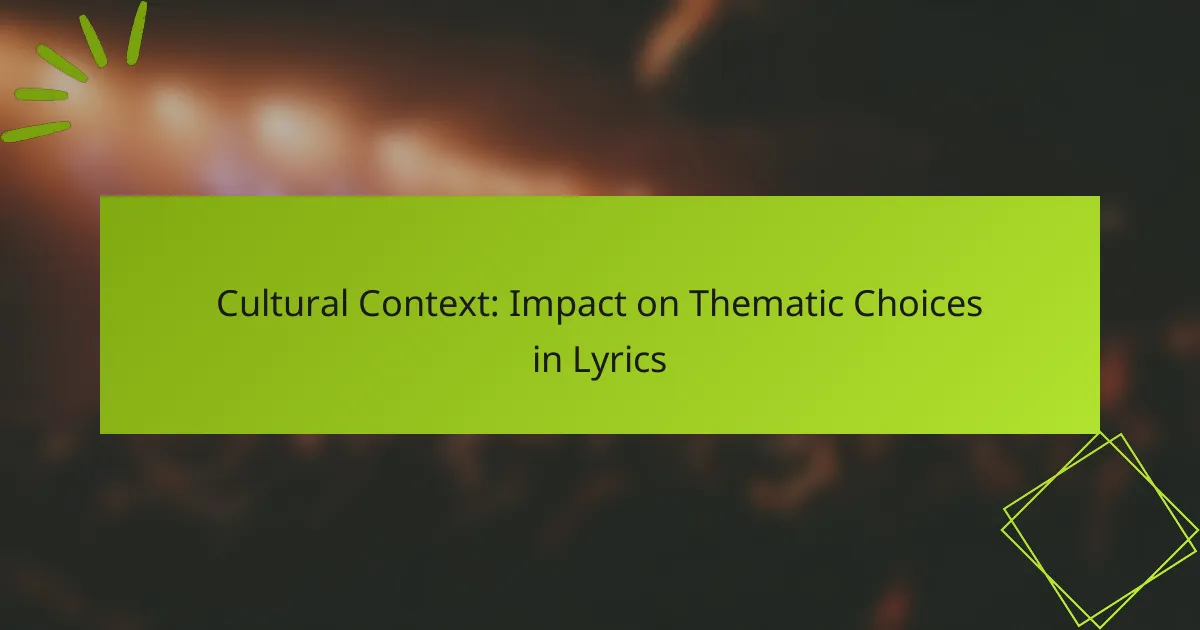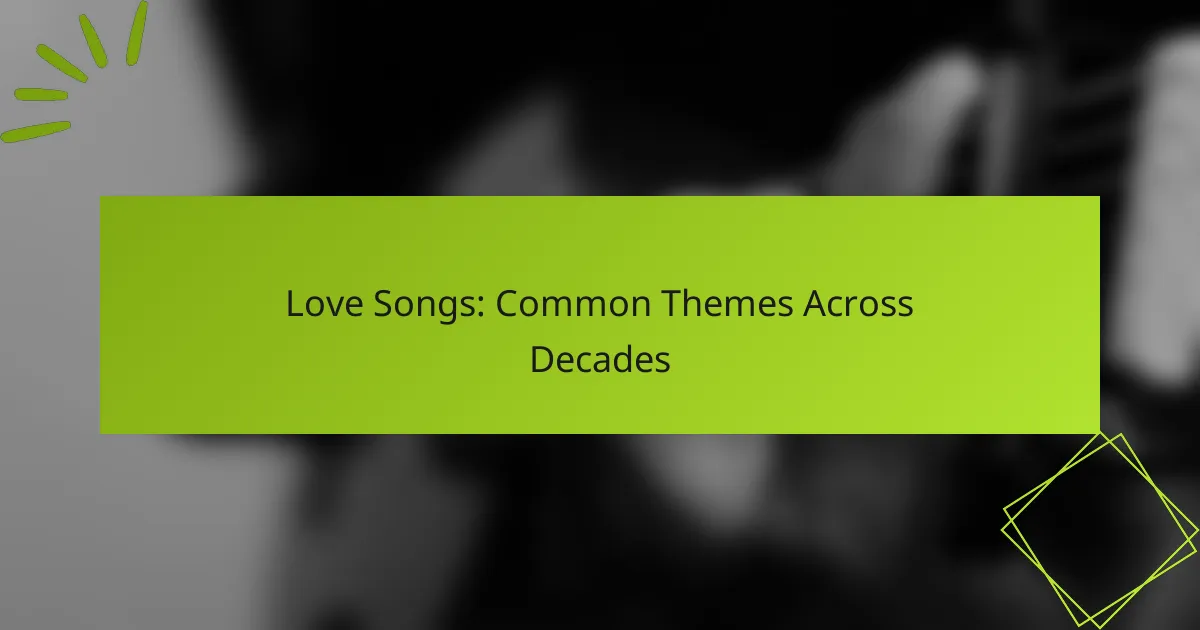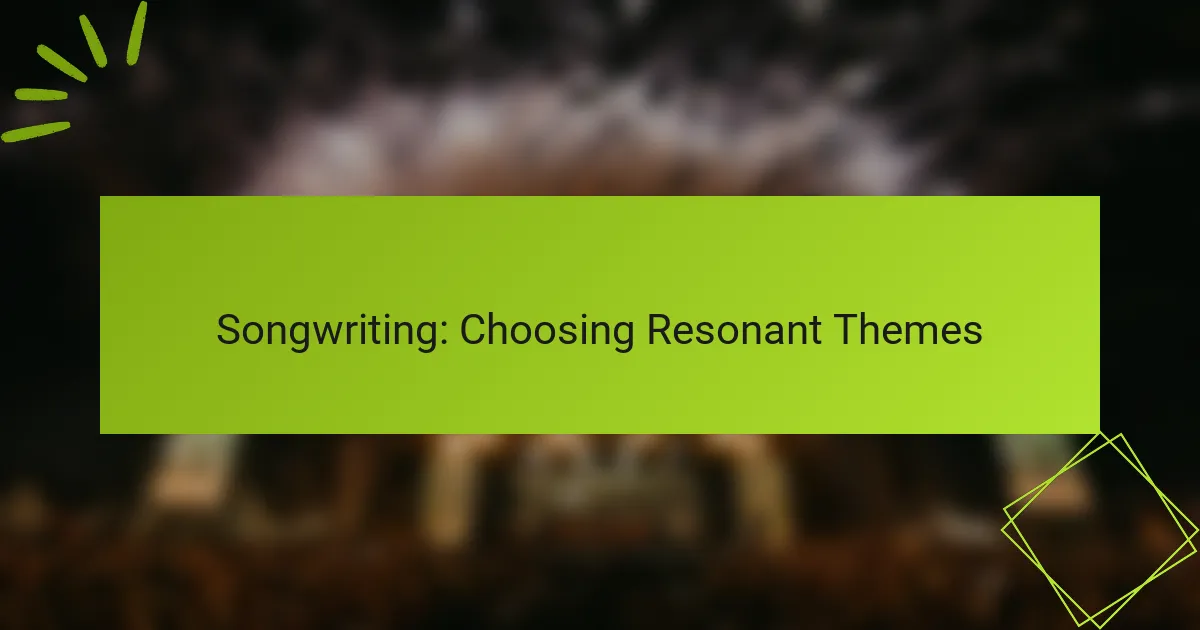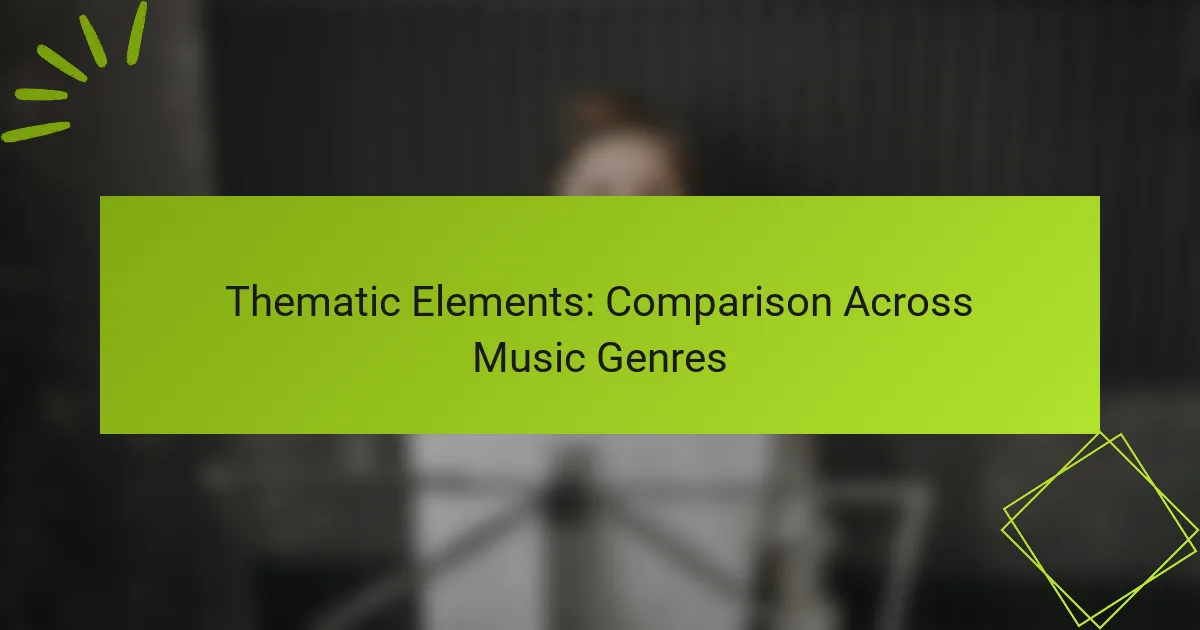Cultural context plays a crucial role in shaping the thematic choices in lyrics, as it mirrors the values and experiences of a society. By drawing inspiration from their surroundings, artists create lyrics that resonate with both personal and communal identities, often exploring themes such as social justice, identity, and relationships. This deep connection to cultural narratives enriches the music and fosters a sense of belonging among listeners.
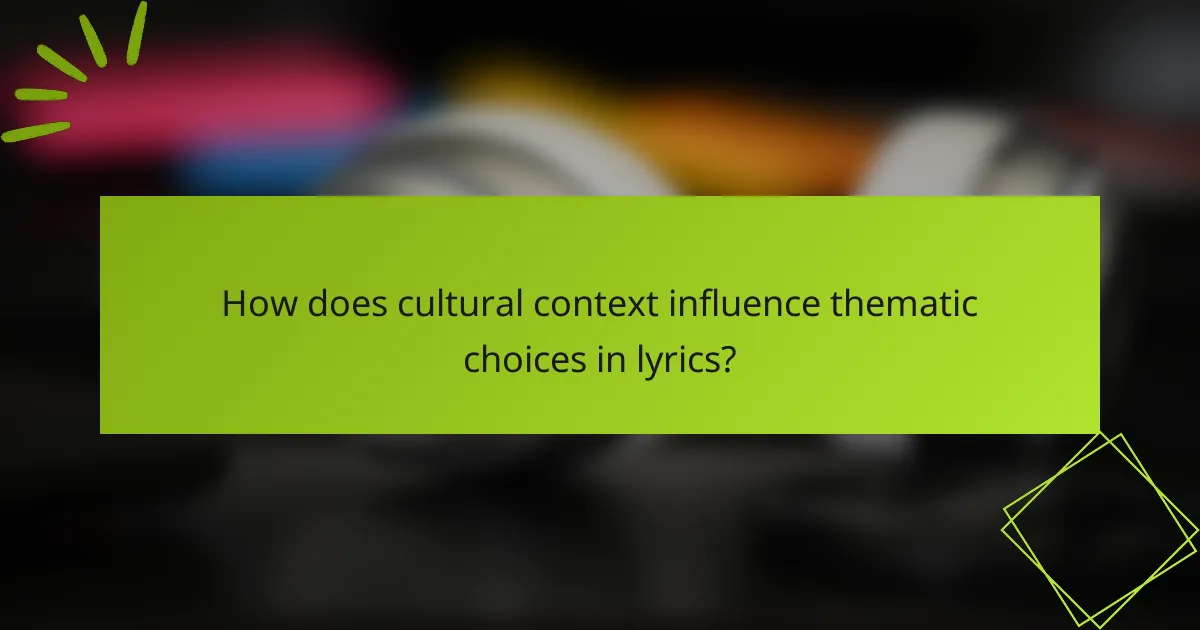
How does cultural context influence thematic choices in lyrics?
Cultural context significantly shapes the thematic choices in lyrics by reflecting the values, beliefs, and experiences of a society. Artists often draw inspiration from their surroundings, leading to lyrics that resonate with listeners on a personal and communal level.
Reflection of societal values
Thematic choices in lyrics often mirror the prevailing societal values of the time. For instance, songs that address social justice issues can highlight the collective consciousness and priorities of a community, such as equality and freedom. Artists may use their platform to challenge norms or reinforce cultural ideals, influencing listeners’ perceptions and actions.
Examples include protest songs during the civil rights movement in the United States, which not only reflected the struggle for equality but also galvanized support for the cause. Similarly, contemporary pop music may address themes of mental health, reflecting a growing societal acknowledgment of its importance.
Historical events shaping narratives
Historical events play a crucial role in shaping the narratives found in lyrics. Artists often respond to significant occurrences, using their music to comment on or process these events. For example, songs written in the aftermath of wars or political upheaval often convey feelings of loss, resilience, or hope.
Consider how the aftermath of events like 9/11 influenced numerous songs that addressed themes of fear, unity, and healing. Such lyrics serve not only as a reflection of the time but also as a means for listeners to connect with shared experiences and emotions.
Regional musical traditions
Regional musical traditions heavily influence thematic choices in lyrics, as different cultures bring unique stories and sounds to the forefront. For example, folk music often incorporates local legends, customs, and dialects, providing a rich tapestry of cultural identity. This connection to place can evoke a sense of belonging and nostalgia among listeners.
In contrast, genres like hip-hop may reflect urban experiences and struggles, using specific language and references that resonate with particular communities. Understanding these regional influences can enhance appreciation for the depth and meaning behind the lyrics, allowing listeners to engage more fully with the music.
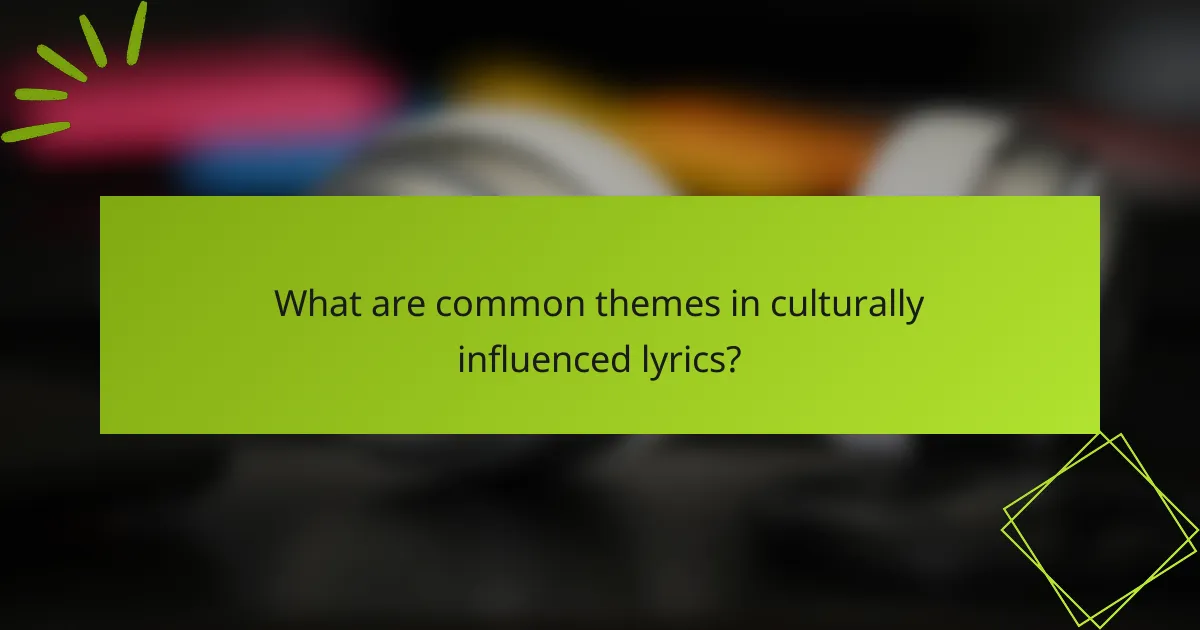
What are common themes in culturally influenced lyrics?
Culturally influenced lyrics often explore themes that resonate deeply with specific communities, reflecting their values, struggles, and experiences. Common themes include identity and belonging, social justice and activism, and love and relationships, each serving as a lens through which artists express their cultural narratives.
Identity and belonging
Identity and belonging are central themes in many culturally influenced lyrics, as artists often grapple with their sense of self within their cultural context. These lyrics may explore personal heritage, community ties, and the challenges of fitting into broader societal norms. For example, hip-hop artists frequently highlight their roots and experiences growing up in specific neighborhoods, creating a strong sense of place and identity.
When writing lyrics that touch on identity, consider incorporating personal anecdotes or cultural references that resonate with your audience. This can foster a deeper connection and evoke shared experiences, making the message more impactful.
Social justice and activism
Social justice and activism are prevalent themes in lyrics that reflect cultural struggles and movements. Artists use their platforms to address issues such as inequality, discrimination, and systemic oppression, often inspiring listeners to take action. For instance, folk and protest songs have historically highlighted civil rights movements, while contemporary genres like pop and rap continue to address current social issues.
To effectively convey messages of social justice in lyrics, focus on specific issues relevant to your audience. Use powerful imagery and direct language to evoke emotion and urgency, encouraging listeners to engage with the cause.
Love and relationships
Love and relationships are universal themes that are often colored by cultural perspectives in lyrics. These songs may explore romantic love, familial bonds, or friendship, reflecting how different cultures perceive and express affection. For example, Latin music often celebrates passionate romance, while R&B may delve into the complexities of love and heartbreak.
When writing about love and relationships, consider the cultural nuances that shape these experiences. Incorporating specific cultural practices or expressions of love can add depth and authenticity to your lyrics, making them relatable to a wider audience.
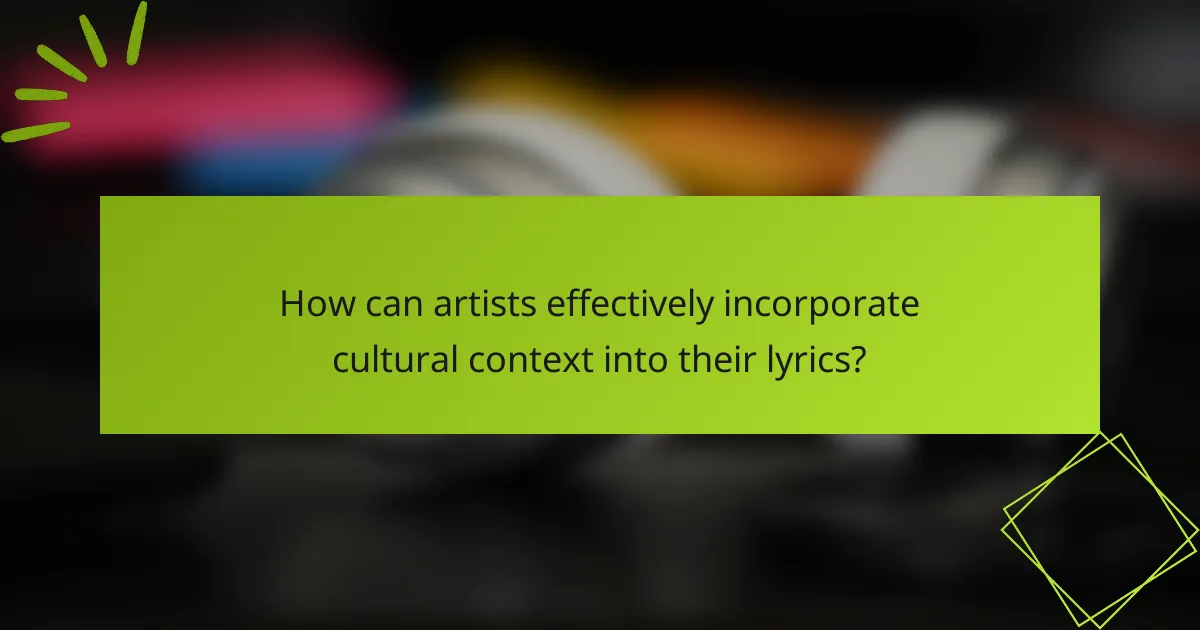
How can artists effectively incorporate cultural context into their lyrics?
Artists can effectively incorporate cultural context into their lyrics by understanding the historical and social nuances of the cultures they draw from. This involves thorough research, community engagement, and collaboration with experts to ensure authenticity and respect in their thematic choices.
Researching cultural history
To incorporate cultural context, artists should start by researching the historical background of the culture they wish to represent. This includes understanding significant events, traditions, and values that shape the community’s identity. For instance, exploring the impact of colonialism or migration patterns can provide depth to lyrical themes.
Utilizing resources such as books, documentaries, and academic articles can enhance an artist’s understanding. Engaging with local libraries or cultural institutions can also yield valuable insights into the narratives that resonate within a community.
Engaging with local communities
Direct engagement with local communities is crucial for artists seeking to incorporate cultural context authentically. This can involve attending community events, participating in discussions, or conducting interviews with local residents. Such interactions can reveal personal stories and perspectives that enrich lyrical content.
Artists should approach these engagements with respect and openness, ensuring they listen actively and acknowledge the voices of those from the culture. This not only fosters trust but also helps avoid cultural appropriation, allowing for a more genuine representation in their work.
Collaborating with cultural experts
Collaborating with cultural experts can significantly enhance the authenticity of an artist’s lyrics. Experts may include historians, cultural anthropologists, or local artists who have a deep understanding of the cultural context. Their insights can guide artists in navigating complex themes and avoiding misrepresentation.
When seeking collaboration, artists should look for individuals who are not only knowledgeable but also willing to share their perspectives. This partnership can lead to a more nuanced approach to songwriting, ensuring that the lyrics resonate meaningfully with both the artist’s audience and the culture being represented.
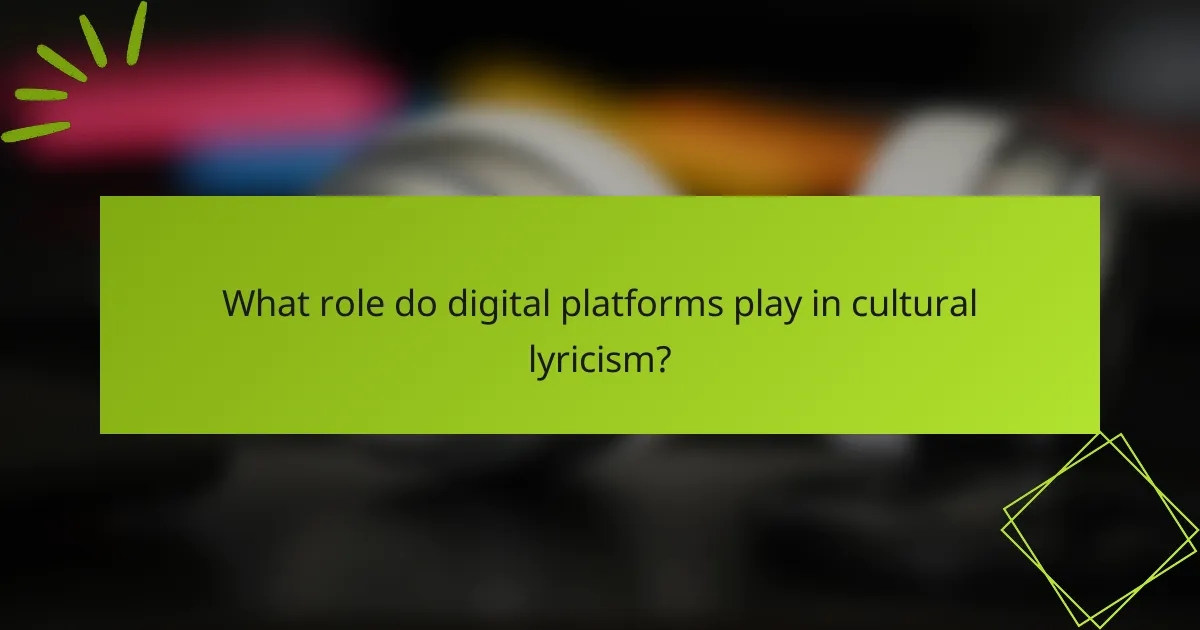
What role do digital platforms play in cultural lyricism?
Digital platforms significantly influence cultural lyricism by providing artists with access to a vast array of musical styles and cultural narratives. These platforms facilitate the sharing and discovery of diverse influences, enabling artists to craft lyrics that resonate with a global audience.
Access to diverse influences
Digital platforms allow artists to explore a wide range of musical genres and cultural expressions from around the world. For instance, a musician in the United States can easily access traditional African rhythms or Latin melodies, incorporating these elements into their lyrics and sound. This cross-pollination enriches the lyrical content and broadens the artist’s creative palette.
Moreover, platforms like Spotify and YouTube curate playlists that showcase international music, making it easier for artists to discover and draw inspiration from various cultural backgrounds. This exposure can lead to innovative thematic choices that reflect a blend of influences.
Global audience reach
Digital platforms enable artists to reach audiences far beyond their local markets, allowing for a global exchange of ideas and themes. A song that incorporates cultural references from multiple regions can resonate with listeners across different countries, enhancing its appeal. This global reach can significantly increase an artist’s fan base and streaming numbers.
For example, a hip-hop artist from Canada might collaborate with a reggae musician from Jamaica, creating a track that appeals to fans in both regions. This collaboration not only broadens their audience but also introduces listeners to new cultural perspectives through lyrics.
Promotion of cultural exchange
Digital platforms actively promote cultural exchange by facilitating collaborations and interactions among artists from diverse backgrounds. Social media allows musicians to share their creative processes, engage with fans, and discuss the cultural significance of their lyrics. This interaction fosters a deeper understanding of different cultures and encourages artists to incorporate varied themes into their work.
Additionally, platforms often highlight cultural events and music festivals that celebrate diversity, further encouraging artists to explore and integrate different cultural narratives into their lyrics. This cultural exchange enriches the music landscape, leading to more inclusive and representative lyrical content.
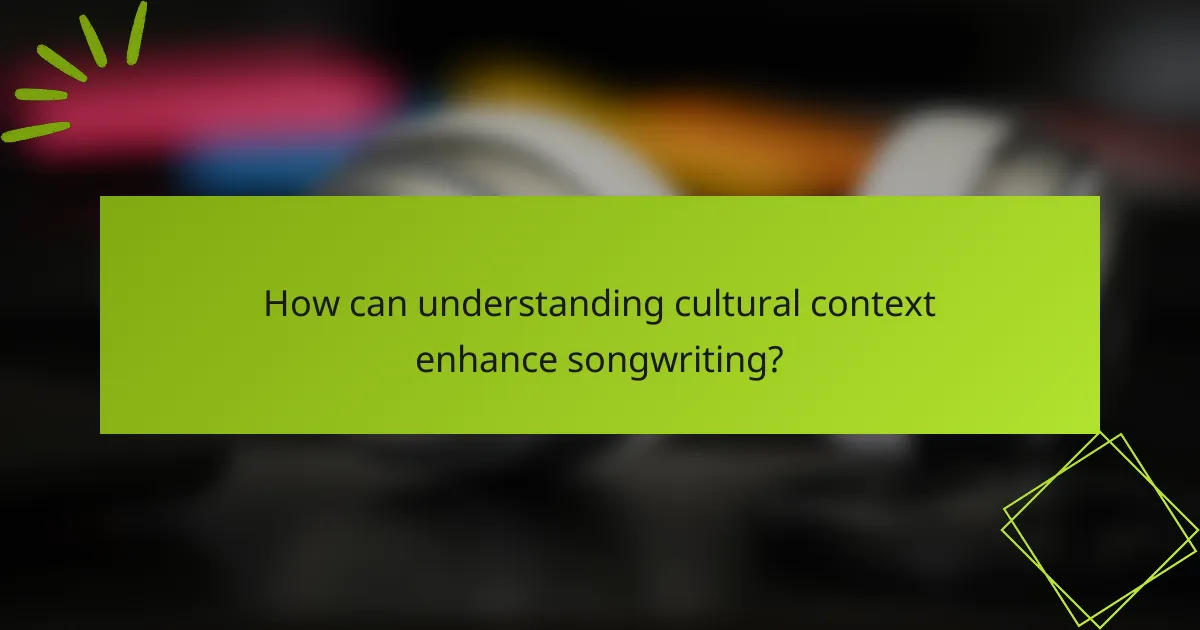
How can understanding cultural context enhance songwriting?
Understanding cultural context can significantly enhance songwriting by providing deeper emotional connections and relevant themes. It allows songwriters to tap into shared experiences and values that resonate with their audience, making their lyrics more impactful.
Deepening emotional resonance
When songwriters incorporate cultural context, they can evoke stronger emotions by referencing familiar symbols and experiences. For instance, using local traditions or historical events can create a sense of nostalgia or pride. This emotional depth can lead to a more profound connection with listeners, as they relate personally to the themes presented.
To deepen emotional resonance, consider the audience’s cultural background and shared experiences. Using metaphors or imagery that reflect local customs can enhance the emotional weight of the lyrics. Avoid generic phrases; instead, aim for specific references that evoke strong feelings.
Expanding thematic depth
Cultural context allows songwriters to explore a wider range of themes that reflect societal issues, values, and aspirations. By addressing topics relevant to a specific culture, such as social justice or community identity, songwriters can create more meaningful narratives. This thematic depth can differentiate a song in a crowded market.
To expand thematic depth, research cultural trends and current events that resonate with your audience. Consider incorporating local dialects or idioms to enrich the lyrics and make them more relatable. This approach not only broadens the thematic scope but also showcases authenticity.
Creating authentic narratives
Authenticity in songwriting is crucial for building trust with listeners, and understanding cultural context plays a key role in this. By drawing from real-life experiences and cultural narratives, songwriters can craft stories that feel genuine and relatable. This authenticity fosters a stronger bond between the artist and the audience.
To create authentic narratives, reflect on personal experiences within the cultural framework. Use storytelling techniques that highlight unique cultural elements, such as local folklore or community struggles. Avoid clichés and strive for originality to ensure the narrative resonates deeply with listeners.
